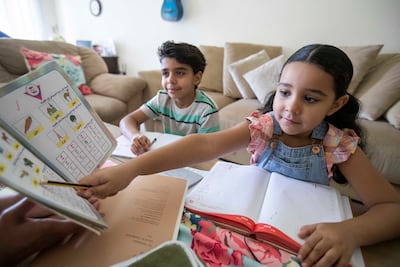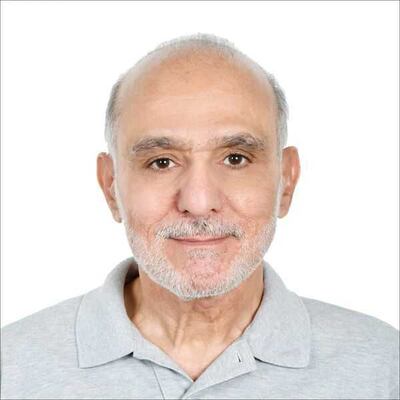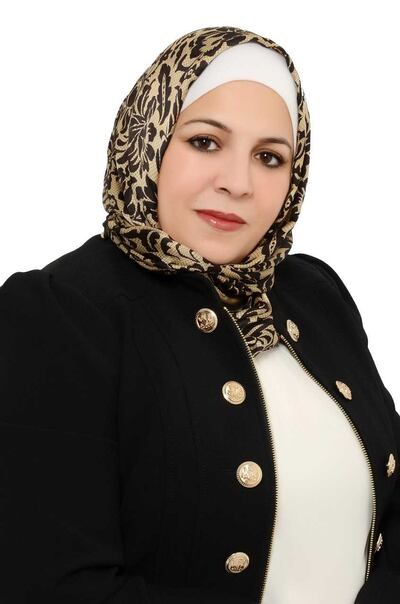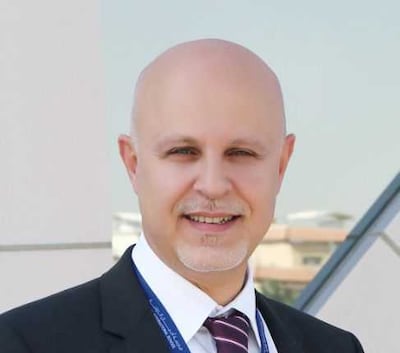Egyptian mother of two Amira Abdel-Rahman is, like a lot of Arab parents in the region, keen to see the Arabic language thrive and be spoken freely at home.
Her children, Mourad, 8, and Laila, 6, speak the mother tongue, but at different levels.
“Laila is moving to Year 2 (British Curriculum) this year. Besides the challenges we all faced during the online learning, she had struggles and still is struggling with learning Arabic at school,” Ms Abdel-Rahman told The National.
“Although we speak our mother tongue language at home almost all the time, writing and pronouncing Arabic letters to her was kind of riddles.”
American Academy for Girls, Mirdif,
She said Arabic is battling against the predominance of English as the common language spoken in the UAE.
Both she and her husband work on improving Laila's language skills by getting her to write down the Arabic letters and read them, but it is not easy now that the summer holidays have started.
The role of parents in improving the Arabic spoken by their children is important, say schools, who are also trying to make the language more engaging and interesting for pupils who speak English more freely.
Spoken by nearly 420 million people worldwide, Arabic is the official language of the UAE.
It includes two categories — Modern Standard Arabic (MSA), also called fus-ha, and the colloquial Arabic, which comes with distinct accents and dialects that can be sometimes intimidating and complex but also fascinating and lyrical.
Ranked among the hardest languages for English speakers to learn by both Rosetta Stone and language learning app Babbel, Arabic can be important in careers or even in family gatherings.
The coronavirus pandemic meant residents from other Arab countries faced even more challenges with their children’s learning of Arabic, with distance learning proving problematic.

Mourad, who mastered the basics of the language before the coronavirus broke out, has not experienced the same difficulties.
“He is one of the most rewarded students in his year group,” she said.
“I believe that is because we started earlier academic Arabic learning for him outside school, with one of those Arabic and Islamic teaching centres.
“He was luckier than his little sister as that was before Covid-19, something that we could not repeat with her under coronavirus lockdown.
“My husband and I cherish our Arabic language and are keen that our kids keep using it as their mother tongue language.”
Programmes like the Arab Reading Challenge have helped to improve the level of Arabic in schools across the region.
Launched in 2015 by Sheikh Mohammed bin Rashid, Vice President and Ruler of Dubai, the challenge encourages a million young people to read at least 50 books in a year.
Schools across the UAE are also doing their best to remind pupils of the importance of reading and attending bookfairs, as these have great educational value.
Encourage interaction
Lebanese teacher Munir Jamal, who has been teaching Arabic for more than two decades, joined Hartland International School Dubai in August.
He said encouraging interaction among pupils in class has helped with the teaching of the language.
“There is always a space for innovation in the teaching and learning process — students have more [of a] role in their responsibility for their own learning. Peer teaching and peer assessment increase this responsibility,” he said.
“Teachers are facilitators in the classroom. They use questioning effectively, encourage inquiry, assess learning and give feedback.
“Continuous follow-up by teachers shows how much they care, and when the teachers show how much they care for the improvement of their students, their students will be keen to meet their teachers’ expectations.”

He said parents are important in strengthening their children’s knowledge of Arabic.
“Parents are partners in the teaching and learning process. They play an especially key role in leading their children to care about subjects and follow them up to monitor their attainment,” he said.
“Parent-teacher conferences are important opportunities to show the co-operation and care for the future of the student. Responsibility is mutual, and feedback from each side must be provided to make sure that the student is not left without guidance.”
Meaningful programme
Maha Al Halawani, head of Arabic at the American Academy for Girls in Mirdif, said they offer one-to-one support to pupils who struggle with the Arabic language, with small group settings for those who need help.
“In addition, we use the statistical data to help teachers understand the way that each student learns encouraging the use of various teaching strategies and different assessment tasks,” she said.
“We modify the curriculum to scaffold for struggling students and support them through encouraging and motivating them to reach their full potential.”

She said engagement is the key to helping pupils increase their language proficiency. Parents also play an essential role in their learning of the language.
“We expect parents to encourage their children to communicate using Arabic and to show pride in learning the language, especially in early years,” she said.
“At AAG, we encourage parents’ involvement in their children learning in several areas including, learning at home, communication, volunteering, decision-making, and community collaboration.”
Teacher training

Lebanese teacher Mohammed Saad, 52, who will join Dubai Arabian American Private School as principal this year, said training Arabic teachers is important in improving pupils' learning of the language.
“The problem with Arabic is that the expectation as a language proficiency should be on a par with at least the English, but the reality is that the capacity for that has a big gap at this moment in time.
“The main reason is that we as parents tend to neglect the Arabic language with our children and focus only on what’s being taught in the classroom. We don’t encourage our kids to read, write and communicate in Arabic.
“The second problem is the limited capacity of Arabic teachers because the problem is that those teachers who majored in Arabic language in the country they came from do not undergo a rigorous training as other teachers do in other subjects.
“To solve this issue, we need to build capacity, to train the teacher very well on the modern teaching pedagogy, and to promote Arabic language in schools.”
At Dubai Arabian American Private school, he said they will focus on a whole school approach to promote Arabic language “so it becomes an important subject” and will launch reading initiatives and Quran recitation competitions, as well as encouraging regular visits to the library to borrow books and engaging pupils in Arabic conversation.










